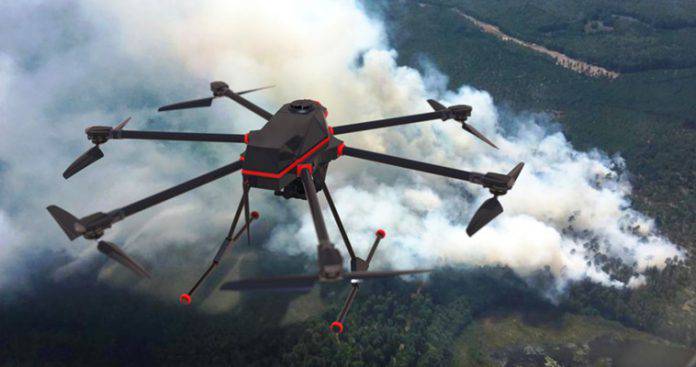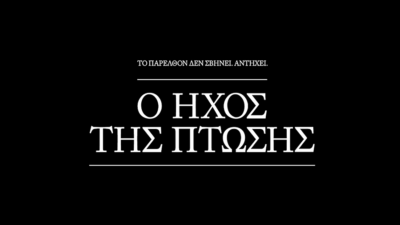Giorgos Tsitsilianos: This is how they choke domestic innovative drone firms
17/09/2020
Drone technology can help curb Turkish provocations in a more economical and efficient way. After all, political forces welcome new technology business initiatives. This, however, is mere verbiage, because in practice the opposite is true.
Recently, we see relevant business activity from Greek companies, such as SAS-Technology of Spirit World Group (SWG). It came as a result of a long-standing effort of applied technological research in the field of unmanned aerial vehicles. In the Greece of the deep crisis, this sector did not receive any help from the State so that the efforts could develop into dynamic business programs.
This dynamic effort found a home in the SWG group. SWG founder and president Michalis Spyridakos shared the vision, recognized the potential of the niche and made a significant investment to support the project. I visited SAS and talked to specialized engineers. I saw a lively space in full swing.
In addition to the MALE aircraft they have built, I saw their recent construction. It is a multi-copter designed from scratch, with a maximum weight of 10 kg and a diameter of 1.6 meters. It is a design that has the ability to carry a dual camera developed by another Greek company specializing in electro-optics, other sensors, and disposable loads.
The innovative EMP-X6 hexacopter
Their goal is to develop an extensive network of cooperation with Greek companies, in an effort to increase the technological footprint of the final system. Also, a fundamental parameter is to create the conditions in the country, in order to stop the currently uncontrolled flow of new technicians and scientists abroad.
What was needed in order to build the innovative EMP-X6 hexacopter, as well as the EMP-X4 quadcopter that is in the prototype completion phase: Designing new components in CAD, solving technical problems that occur and redesigning some of them. To understand the scope of the project, the EMP-X6 consists of almost 250 distinct components that must work perfectly together.
This requires drawing shops, electronics workshops, machine shops, composite workshops, and 3D printers, some of which were made by them, as the specific large-scale specifications required were not covered by ready-made models on the market. Technical instruction manuals, maintenance instructions, as well as detailed illustrated material catalogs were also prepared.
However, the standardization followed, in order to ensure structural traceability (Configuration Control) also plays an important role. Each component manufactured is assigned a specific Part Number. Each change-modification-improvement in a component is registered and connected to the Serial Number of each polycopter that leaves the production line, as well as to all other components that it affects or cooperates with.
Another parameter is that the entire design of the systems is based on Open Source Software and corresponding Hardware they chose to use. These have an advantage in electronic security and functionality-adaptability of the special requirements they have, depending on the closed systems that are required to communicate online with the manufacturer.
Useless specifications and Greek products
However, it’s at this point that the difficulties begin! What are the conditions for similar Greek companies, such as SAS, to have the potential to promote their products in a first phase on the Greek market and then abroad? I researched the situation that prevails in public tenders. I was impressed by the characteristic diversity of specifications.
I found that there are criteria and special certifications in the competitions that are derived from what the big foreign companies advertise. Criteria that are unfortunately copied by government officials, without realizing the impact that this may have on the competitiveness of products of Greek origin. As an Air Force aircraft engineer, I am at least concerned about the need for such criteria.
It is known that the industrial giants that produce hundreds of thousands of copies of their products, want to raise the bar, loading their products with dozens of certifications in various optional standards. Since the cost is divided into tens of thousands of products of each model. The current Greek manufacturer, however, will manufacture only a few dozen models with special requirements. Each lot may need a different certification.
In this case this significant cost is divided among a few pieces and therefore competitiveness disappears. Are we, then, playing the game of the competitors of the Greek economy, unabashedly adopting any certification requirement in a specific specification that seems simply attractive to us? Instead of requiring expensive certificates from usually foreign laboratories, could we simply set criteria for technical conformity assessment instead of Compliance to Standards vs Certification, so that we pay attention to the substance and not the letter?
Why should it have to be tested in the EU
Another aspect I saw in tenders is the mandatory requirement that the product be in use by an EU government agency for one year. How will a new Greek company compete, no matter how good it is, on such terms? Another strange thing is the condition of certification of companies participating in tenders in standards other than the expected standard of certification of the production process (eg ISO 9001).
That is, certifications of the company that produces polycopters are requested, in environmental standards, in communication security standards, etc, under penalty of exclusion. Properties that either do not concern the product, or concern only the special equipment placed on them and therefore the manufacturer of the subsystem. In any case, if these are important, why doesn’t everyone ask for them?
In my attempt to answer the questions, I quote some interesting relevant links: goldmansachs.com, www2.deloitte.com, businessinsider.com, evidencemagazine.com, pwc. Why are unmanned systems becoming increasingly important as a growth economic factor? The results you can look up were beyond my expectations and I wondered: Are these known to the Greek political system?
Are the Ministries of Development, Defense, Civil Protection, and Shipping aware of these? If they have realized the problem, why not assess and implement the requirements for systems that are similar? Why not support and guide domestic efforts to capture their market space?
Why do they allow each body to ask for its own almost unique requirements-specifications, which in essence torpedo every Greek effort? How is it possible for this important sector to grow? For so many years, with this not at all innocent tactic, we have deindustrialized the country and drowned every novel business innovation.
Bureaucratic syndromes
The second question is whether there are indeed reasons for preferring open source systems over systems controlled exclusively by the manufacturer? Valuable information has been found here, from sites such as droneanalyst.com and globaluavtech.com advocating open source selection. Another issue is the potential security issues of locked online controlled systems.
I wonder if all this was in the knowledge of the authorities of public bodies and the Ministry of Defense, when they choose systems of large companies, creating, by adopting unnecessary criteria, conditions of almost exclusion of domestic systems? A look at the links below is revealing dronelife.com, dronelife.com, doi.gov, and techcrunch.com.
This path along the field of unmanned systems must be taken seriously, if we really want as a country to be ahead of technological development. I hope that what has been said will arouse the interest of those in charge and that a serious effort will be made to resolve the problems. We have brains, as well as ideas that can be put to the task, if we eliminate bureaucratic syndromes, anachronistic logic, and sometimes selfishness. If anyone disputes the accuracy of the above, let them look for how many domestically designed and constructed systems have been procured by government agencies and how many from international companies.
In conclusion, it is worth mentioning the technical report Study Analyzing the Current Activities in the Field of UAV of F&S on behalf of the EU published in 2007. At that time, few understood the prospects of unmanned systems. But it is worth studying and you will understand the root of many evils that we experience today.
On page 16 there is the estimate for Greece. Compare it with that of other Member States, even small developing ones. It simply ranks us as potential technology customer in the future, unlike other member states who say they will focus on systems of their own technology. The above map (p. 77) shows the level of awareness and activism of European countries in this new technology in 2007.






